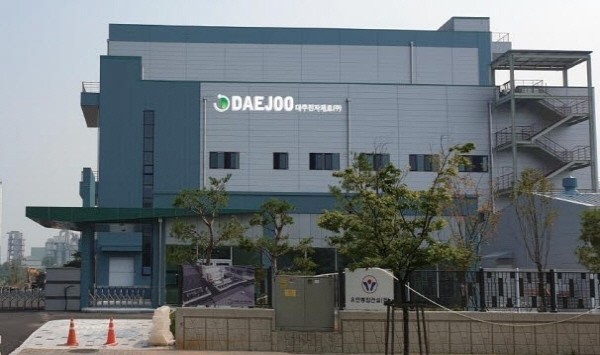Key materials for improving EV battery performance
Plans to convert Siheung facility into a smart factory
The largest production capacity of 3000 tons in Korea with the new smart factory
Plans to incr

Daejoo Electronic Materials is converting its secondary battery silicon anode material business facility into a smart factory. The demand for silicon anode materials is rapidly increasing in the expansion of the EV market. Using a smart silicon anode material production facility, Daejoo Electronic Materials responds flexibly to market demand.
By next August, Daejoo Electronic Materials plans to promote the initial project to build a smart factory at its Siheung plant in Gyeonggi Province. The Siheung facility for silicon anode materials was its first facility, and plans to upgrade into a smart factory.
Daejoo Electronic Materials is the first in the domestic industry to mass-produce silicon anode materials and enhance its production capacity. When the facility will becomes a smart factory, it will be able to have a capacity of 3,000 tons of silicon anode material, which is the largest amount in Korea. This will greatly increase the automation rate of the silicon anode material manufacturing process, and will improve production efficiency and quality competitiveness simultaneously.
Daejoo Electronic Materials’s silicon anode material has 10 folds higher energy capacity than the existing graphite anode material. It is under the spotlight as a core material that can enhance the charging and discharging performance of EV batteries.
The silicon anode materials are growing at an average annual rate of 54% to meet the demand for EVs according to a market research firm. Daejoo Electronic Materials supplies anode materials with a silicon content of 5% to global auto manufacturers, and is developing products with a silicon content of 5%. This product was installed in the EV battery of LG Energy Solution. Daejoo Electronic Materials is increasing the production scale of its domestic business facilities in order to meet the demand for silicon anode materials. It plans to reach an annual production capacity of 3,000 tons by next year, and expand the capacity to more than 100,000 tons by 2030.
Daejoo Electronic Materials is planning to expand investment for converting its facility into a smart factory.
It is expected that additional investments will be made to upgrade into the smart factory in order to expand production capacity.
Daejoo Electronic Materials is enhancing its business competitiveness to develop silicon anode materials as a future growth engine. The company also minimizes the burden of production cost by directly producing raw materials for silicon anode materials, which is mostly produced in China. Daejoo Electronic Materials is expected to localize raw materials for silicon anode materials made in China, and enhance production efficiency.

By Staff Reporter Jiwoong Kim (jw0316@etnews.com)